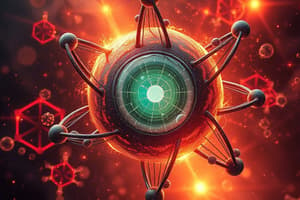Podcast
Questions and Answers
Which of the following particles make up the nucleus of an atom?
Which of the following particles make up the nucleus of an atom?
- Electrons and neutrons
- Protons, electrons, and neutrons
- Protons and neutrons (correct)
- Protons and electrons
What distinguishes one chemical element from another?
What distinguishes one chemical element from another?
- The size of their atoms
- The number of electrons in their atoms
- The number of neutrons in their atoms
- The number of protons in their atoms (correct)
What defines the isotope of an element?
What defines the isotope of an element?
- The number of neutrons (correct)
- The number of protons
- The size of the atom
- The number of electrons
Why can't humans see atoms with conventional microscopes?
Why can't humans see atoms with conventional microscopes?
Where is the majority of an atom's mass located?
Where is the majority of an atom's mass located?
Which subatomic particles are found in the nucleus of an atom?
Which subatomic particles are found in the nucleus of an atom?
What distinguishes one chemical element from another?
What distinguishes one chemical element from another?
What determines the isotope of an element?
What determines the isotope of an element?
Why can't humans see atoms with conventional microscopes?
Why can't humans see atoms with conventional microscopes?
Where is the majority of an atom's mass located?
Where is the majority of an atom's mass located?
Flashcards are hidden until you start studying
Study Notes
Key Facts about Atoms
- An atom is composed of a nucleus containing protons and neutrons, surrounded by electrons.
- Atoms are the fundamental particles of chemical elements.
- The number of protons in an atom determines its chemical element.
- For example, an atom with 11 protons is sodium, and an atom with 29 protons is copper.
- The number of neutrons in an atom determines its isotope.
- Atoms are incredibly small, measuring about 100 picometers in diameter.
- To put it into perspective, a human hair is a million carbon atoms wide.
- Atoms are too small to be seen with conventional microscopes due to their size being smaller than the shortest wavelength of visible light.
- Quantum effects make it impossible to accurately predict the behavior of atoms using classical physics.
- The nucleus of an atom contains more than 99.94% of its mass.
- Protons have a positive electric charge, while electrons have a negative charge.
- Neutrons have no electric charge.
Studying That Suits You
Use AI to generate personalized quizzes and flashcards to suit your learning preferences.




